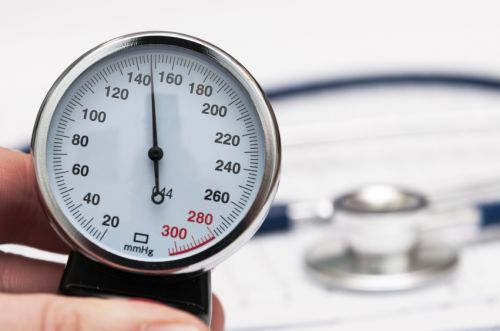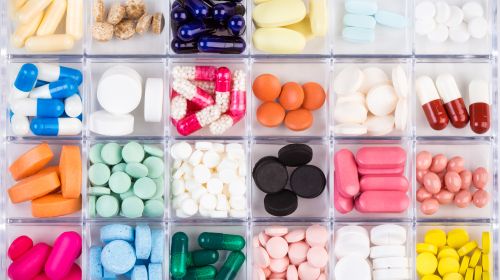With chronic kidney failure, the kidneys gradually lose their capacity. Treated in good time, the kidney failure can be stopped or reversed. However, many kidney patients do not experience symptoms until the disease has progressed.
- The amount of protein excreted in the urine indicates the stage of chronic kidney failure.
- © iStock.com/bluecinema
With chronic kidney failure, kidney function gradually deteriorates over the course of months or years. More and more functional kidney tissue perishes and the kidneys ultimately no longer perform adequately. Usually the disease affects both kidneys.
In the case of chronic kidney failure, which is also known as chronic kidney weakness or chronic kidney failure, the body no longer manages to fish metabolic waste products from the blood and excrete them with the urine. The substances accumulate in the blood.
What are the symptoms of chronic kidney failure?
Chronic kidney failure is insidious and initially causes few or no symptoms. Many people do not even notice the impaired kidney function.
The following early symptoms indicate chronic kidney failure:
Increased excretion of very pale, barely colored urine
High blood pressure for the first time, or high blood pressure that is increasingly difficult to control
Water retention (edema) in the tissues: legs, face (around the eyes) or all over the body
Blood in the urine: the urine is colored red
- Foamy urine due to high levels of protein in the urine
If the kidneys can no longer fulfill their function, the following symptoms appear:
If chronic kidney failure reaches the end stage, almost all organs and body functions are impaired.
High blood pressure that can no longer be controlled
Declining amounts of urine
Water retention
shortness of breath
Loss of appetite, nausea, vomiting
Irregular heartbeat
Drowsiness, drowsiness
Muscle cramps, symptoms of paralysis
unconsciousness
Chronic kidney failure – the causes are often other diseases
The most common causes of chronic kidney failure are other diseases, especially diabetes mellitus and high blood pressure (hypertension):
Glomerulonephritis: It is an inflammation of the kidney corpuscles. The glomeruli filter salts, pollutants, metabolic products and water from the blood. Most often, glomerulonephritis affects both kidneys. Doctors differentiate between the much more common primary form of glomerulonephritis, in which the immune system usually attacks the kidney corpuscles, and a secondary form, in which other diseases outside of the kidney are responsible, for example streptococcal infections. Drugs can also cause secondary glomerulonephritis.
Medication: In interstitial nephritis, the small kidney tubules and the connective tissue of the kidneys (interstitial spaces) are inflamed. The most common causes are drugs such as antibiotics, proton pump inhibitors, cytostatics, or non-steroidal anti-inflammatory drugs. The immune system reacts excessively to the active ingredients, so an allergic reaction occurs. Infections with viruses or bacteria are less common causes of interstitial nephritis.
Diabetes mellitus: Diabetes is a very common cause of chronic kidney failure. A long-term consequence of diabetes is the so-called diabetic nephropathy. The walls of the smallest blood vessels are damaged: They "saccharify", thicken and lose their elasticity. As a result, the blood flow is restricted and the kidneys are no longer adequately supplied with oxygen and nutrients. The cause of diabetic nephropathy is poorly controlled blood sugar levels, in which the blood sugar levels are elevated over the long term.
Cystic kidneys: They are one of the hereditary kidney diseases. From birth, those affected have kidneys that are interspersed with many fluid-filled cavities (cysts). These cysts severely limit kidney function from the start. Most patients suffer from chronic kidney failure before the age of 60 and need dialysis or a kidney transplant.
High blood pressure: Hypertension damages the kidney corpuscles and reduces kidney function. Conversely, declining kidney function causes blood pressure to rise. The reason: the body increasingly produces blood pressure-increasing hormones and stores water in the tissue (edema). Untreated high blood pressure damages all vessels, including those of the kidneys.
-

Would you like to document your blood pressure regularly? A blood pressure chart will help you and your doctor identify dangerous swings and spikes.
to download the blood pressure table
-
- Vascular diseases: They are mainly caused by arteriosclerosis, which is actually a normal aging process. However, certain risk factors accelerate the hardening of the arteries: obesity, high blood lipid levels, high blood pressure, lack of exercise or smoking. Because of the deposits (plaques), the vessels that supply the kidneys lose their elasticity and they narrow. Thus, the blood flow is restricted, even to the kidneys. The filter organs are poorly supplied with blood, supplied with oxygen and nutrients and finally kidney tissue dies.
Rare causes of chronic kidney failure
Enlarged prostate or stones in the ureter, bladder, or urethra that prevent urine from flowing out
Cancer of the kidneys, for example kidney cell cancer
Amyloidosis: proteins are deposited in the kidneys and other organs and hinder the exchange of substances; the kidney loses its function.
Hereditary factors (genes): People with a family history of kidney disease are more likely to develop chronic kidney failure.
Diagnosis of renal failure – this is how the doctor proceeds
At the beginning of the diagnosis of renal insufficiency there is always a discussion with the doctor about the medical history (anamnesis). As part of the physical exam, the doctor taps the kidneys and checks to see if this is causing pain. It also measures blood pressure and heartbeat. Palpation of the skin and neck veins provide information about the state of the fluid balance and whether water has accumulated.
An ultrasound examination shows how big the kidneys are, what shape they are, whether there are bottlenecks and the urine is stuck or whether the kidney vessels and kidney tissue are healthy.
Urine test: This is what the doctor reads in the urine
The urine test also provides information about possible kidney failure. The doctor analyzes the following values in the urine collected over 24 hours:
Protein: The presence of protein in the urine (especially albumin) indicates that the kidneys are not working properly. Because normally the urine contains little or no protein (maximum 150 milligrams per day). A quick urine test using a test strip for protein and blood cells in the urine allows an initial assessment. The course of renal insufficiency can also be easily observed on the basis of the amount of protein excreted. If the kidney weakness continues, the doctor will find steadily increasing amounts of protein.
Urine sediment: The urine is centrifuged and the doctor looks for red blood cells (erythrocytes in the urine) and white blood cells (leukocytes in the urine) in the remaining sediment under the microscope.
Glomerular Filtration Rate (GFR): The GFR cannot be measured directly; doctors have to calculate the GFR value from the creatinine value or the cystatin C in the blood. These serve as markers for GFR determination. The GFR blood value shows how much volume the kidney corpuscles (glomeruli) filter per unit of time. Doctors can identify chronic kidney weakness and its severity at an early stage using the GFR.
There are different formulas to calculate the GFR value. Examples are the CKD-EPI formula, the MDRD formula or the Cockcroft-Gault formula. You can find your own electronic GFR calculator for this on the Internet. The GFR normal values are between 90 and 120 milliliters per minute (ml / min).
Blood test: how well are the kidneys working?
If the filtering capacity of the kidneys is reduced, urinary substances that are normally excreted in the urine accumulate in the blood. And doctors can prove these with a blood analysis:
Creatinine: The normal values are 8-12 milligrams per liter (mg / l). With renal insufficiency, the creatinine in the serum is too high.
Urea: 200-450 mg / l are normal – with renal insufficiency the urea value is too high.
Cystatin C: Sometimes doctors determine this value instead of creatinine.
The problem is that the creatinine level often only rises when the kidney has already lost half its performance. The diagnosis of mild renal insufficiency is therefore usually not possible using the creatinine value. Instead, doctors use what is known as creatinine clearance for diagnosis.
Five stages of chronic renal failure
Doctors divide the disease into five stages. The basis is the so-called KDIGO guidelines (KDIGO = Kidney Disease: Improving Global Outcomes). The most important value for staging is the glomerular filtration rate (GFR) – the volume of fluid filtered. The GFR shows how well the kidneys are filtering.
Stage 1: GFR over 90, kidney function is normal, blood values for urinary substances (creatinine, urea) are in the normal range, the kidneys may excrete more proteins in the urine (proteinuria), further tests will follow to prevent deterioration in kidney function
Stage 2: GFR 60 to 89, the kidneys seem to continue to function normally, but more detailed examinations show the reduced performance, the blood test does not always provide information on the kidney weakness
Stage 3: GFR 30 to 59, doctors find abnormal levels of creatinine and urea in the blood; Patients feel the first symptoms of kidney weakness such as high blood pressure, reduced performance, fatigue; the risk of cardiovascular disease increases; Doctors need to reduce the dose of drugs that are eliminated by the kidneys to prevent side effects
Stage 4: GFR 15 to 29, the kidney function is now so limited that the whole body can feel it; the symptoms increase: loss of appetite, tiredness, vomiting, nausea, itching, bone pain, water retention (edema)
Stage 5: GFR below 15, there is a risk of permanent kidney failure: Blood washing (dialysis) is essential, a kidney transplant is now an option
In general: Patients with certain underlying diseases such as diabetes or high blood pressure should have their kidney function checked at least once a year.
Chronic kidney failure: this is how the disease can be slowed down
Treatment of chronic kidney failure aims to slow the progression of the disease and prevent a final renal failure. The earlier treatment begins, the better the chances of success. In many cases, there is no cure for chronic kidney failure.
Medicines help against kidney failure:
People with diabetes are given drugs that lower blood sugar.
To treat high blood pressure, doctors use antihypertensive drugs: ACE inhibitors or angiotensin II receptor antagonists (also sartans, AT1 blockers). Active ingredients from these groups also put less strain on the kidneys.
Anti-inflammatory drugs help with inflammation of the kidney corpuscles. They reduce the activity of the immune system. Frequently used active ingredients are cortisone, cyclosporine or cyclophosphamide.
For anemia, doctors give the hormone erythropoietin (EPO) to stimulate the production of red blood cells.
Doctors usually use drugs from the group of statins against increased blood lipid levels (cholesterol) and vascular calcification (arteriosclerosis).
Diuretic drugs increase the excretion of salt and water.
Phosphate-binding agents (calcium carbonate, calcium acetate, calcium citrate) help if the phosphate levels are too high despite a low-phosphate diet.
Vitamin D and / or vitamin D analogues bring the calcium and phosphate metabolism back into balance.
Treating chronic kidney failure – you can do it yourself
Pay attention to well-adjusted values for high blood pressure and diabetes. In this way, you can often slow down the further development of kidney weakness (or prevent the disease from occurring).
Do sports and exercise regularly in everyday life.
Do not smoke and if you are a smoker, try to give up.
Eat a low-salt diet.
A low-protein diet can also help with kidney failure. It is best to seek advice from a nutritionist.
Blood washing (dialysis, artificial kidney)
Sometimes, despite medication and a specialized diet, kidney function drops so low that dialysis becomes unavoidable. Blood washing removes waste and toxins from the blood, so it does the job of the kidneys. Starting blood washing early increases the chances of treatment.
Kidney transplant
A kidney transplant is the last resort in treatment for chronic kidney failure. Doctors transplant the kidney from a dead or living donor. There are currently more than 8,000 people in Germany on the waiting list for a new kidney.
Prevent chronic renal failure
You can prevent chronic kidney failure by preventing certain underlying diseases that are responsible for kidney failure. Above all, these are diabetes and high blood pressure. By turning off the risk factors for these diseases as much as possible, you may be able to prevent both diseases from developing. These include:
Eat a healthy diet with plenty of it Fruits, vegetables and whole grains; it is better to use vegetable rather than animal fats, fish more than meat, and prefer low-calorie beverages such as water or unsweetened tea; drink sufficient amounts: 1.5 to two liters per day are recommended.
Eat as much as possible low in salt, because salt is considered to be a blood pressure driver.
Move As much as possible instead of sitting on the couch: Endurance sports such as hiking, swimming or cycling are good; Weight training in the gym is also recommended in moderation.
Smoke You better not, because smoking is an important risk factor for arteriosclerosis. If you are a smoker – try to get rid of the vice.
Let high blood pressure, treat high blood sugar values and excessively high blood lipids adequately with medication, check these values regularly.
Painkiller use it sparingly; The same goes for antibiotics, which can also damage the kidneys.
If you have chronic kidney failure risk factors, have your kidney function checked regularly doctor check, it can detect performance degradation sooner.
And if you suffer from diabetes or high blood pressure, always get adequate treatment in good time. Pay attention to well-adjusted blood sugar and blood pressure values. This is the best way to prevent chronic kidney failure.





